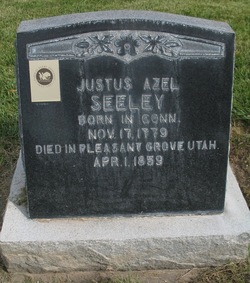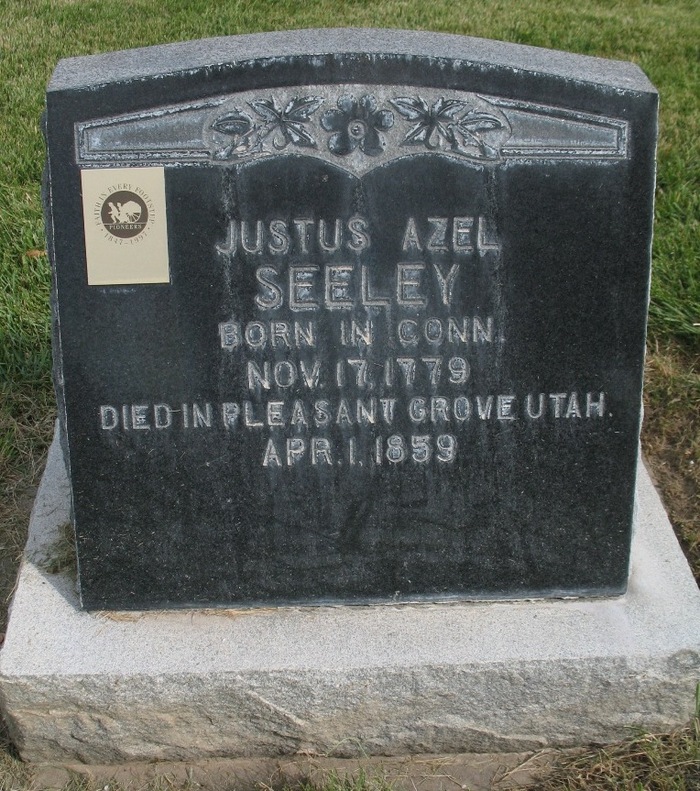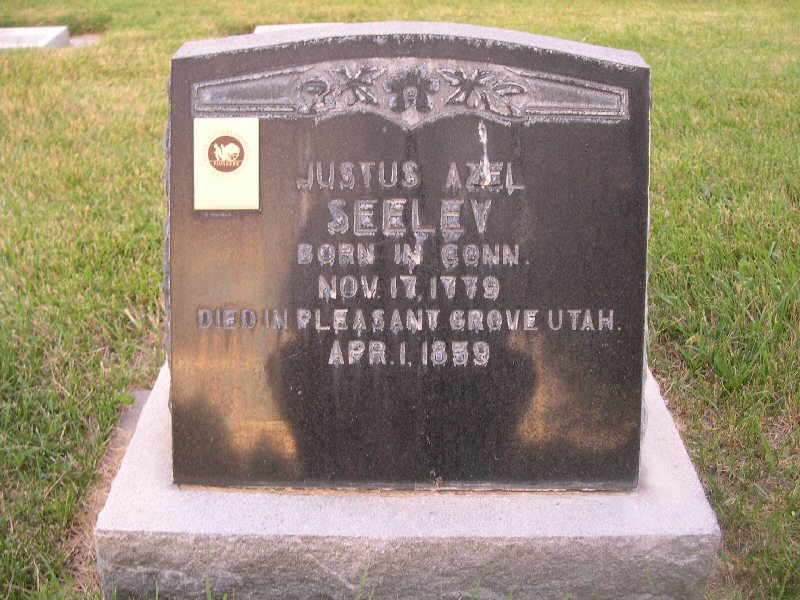While living in Pennsylvania Justus became acquainted with and married Mehitable Bennett. In 1807 the couple moved to Upper Canada (Ontario), locating in Pickering, Holme District.
In January of 1812, when war broke out with the U.S., Justus was conscripted into the British military and was quartered at a barracks at Markham, near Toronto, Ontario. Here he stayed until about May of that year when complications in his wife pregnancy necessitated his returning home on furlough. To satisfy the military, he had his father take his place on the roster. May 18,1812 proved to be a profound date for Justus - his son William Stewart was born while his father died from an illness he had contracted while serving as Justus's replacement in the Markham army barracks.
Justus continued to reside in Upper Canada, operating a shipping business on Lakes Erie and Ontario, until around 1838. It was then that he and Mehibable, along with their six children, were converted to the LDS, or Mormon, faith and were baptized by Almon Babbitt on February 15, 1838. At that time there was a strong desire among adherents of that faith to "gather together in Zion" which was then located in Missouri. Upon their arrive at the town of DeWitt, Missouri, however, the LDS Church was under heavy persecution and the Missouri mobs had already driven the faithful out of the state. The Seelys likewise had to flee and ended up in Calhoun County, Illinois in November of that year.
In the spring of 1839 they removed to the vicinity of Burlington, Iowa where they remained until the spring of 1841, when they moved to Nashville, Tennessee. Within six years of settling in Illinois, persecutions again flared against the Mormons. All members of that faith were forced to flee that state as well and head into the North American wilderness. Justus and Mehitable were no exception as they joined their fellow congregants on the long overland journey, reaching Winter Quarters on the Missouri River near present day Omaha on October 20, 1846. There they built a small house in which they spent the winter.
On June 8, 1847 they crossed the Missouri River and joined the Edward Hunter's 100 wagon train made up of LDS emigrants. They arrived in Salt Lake City on September 29, 1847, 68 days after the first wagon train of LDS emigrants under Brigham Young had arrived. Upon arrival, they located and built a cabin at the Old South Fort (Pioneer Park that is located between 3rd and 4th West and 3rd and 4th South in Salt Lake City) and Justus became the community's cooper (barrel maker).
By 1858 Justus and Mebitable were living in Battle Creek (Pleasant Grove), Utah with the families of their sons William S. and J. Wellington, who had set up a cattle and sheep operation.
After Justus's death, their sons then moved to Sanpete County and, after improving the land around what would become the community of Pleasant Grove, Mehitable followed suit and joined them for the remainder of her life.
Contributor: Mike Lump (49019737) •
While living in Pennsylvania Justus became acquainted with and married Mehitable Bennett. In 1807 the couple moved to Upper Canada (Ontario), locating in Pickering, Holme District.
In January of 1812, when war broke out with the U.S., Justus was conscripted into the British military and was quartered at a barracks at Markham, near Toronto, Ontario. Here he stayed until about May of that year when complications in his wife pregnancy necessitated his returning home on furlough. To satisfy the military, he had his father take his place on the roster. May 18,1812 proved to be a profound date for Justus - his son William Stewart was born while his father died from an illness he had contracted while serving as Justus's replacement in the Markham army barracks.
Justus continued to reside in Upper Canada, operating a shipping business on Lakes Erie and Ontario, until around 1838. It was then that he and Mehibable, along with their six children, were converted to the LDS, or Mormon, faith and were baptized by Almon Babbitt on February 15, 1838. At that time there was a strong desire among adherents of that faith to "gather together in Zion" which was then located in Missouri. Upon their arrive at the town of DeWitt, Missouri, however, the LDS Church was under heavy persecution and the Missouri mobs had already driven the faithful out of the state. The Seelys likewise had to flee and ended up in Calhoun County, Illinois in November of that year.
In the spring of 1839 they removed to the vicinity of Burlington, Iowa where they remained until the spring of 1841, when they moved to Nashville, Tennessee. Within six years of settling in Illinois, persecutions again flared against the Mormons. All members of that faith were forced to flee that state as well and head into the North American wilderness. Justus and Mehitable were no exception as they joined their fellow congregants on the long overland journey, reaching Winter Quarters on the Missouri River near present day Omaha on October 20, 1846. There they built a small house in which they spent the winter.
On June 8, 1847 they crossed the Missouri River and joined the Edward Hunter's 100 wagon train made up of LDS emigrants. They arrived in Salt Lake City on September 29, 1847, 68 days after the first wagon train of LDS emigrants under Brigham Young had arrived. Upon arrival, they located and built a cabin at the Old South Fort (Pioneer Park that is located between 3rd and 4th West and 3rd and 4th South in Salt Lake City) and Justus became the community's cooper (barrel maker).
By 1858 Justus and Mebitable were living in Battle Creek (Pleasant Grove), Utah with the families of their sons William S. and J. Wellington, who had set up a cattle and sheep operation.
After Justus's death, their sons then moved to Sanpete County and, after improving the land around what would become the community of Pleasant Grove, Mehitable followed suit and joined them for the remainder of her life.
Contributor: Mike Lump (49019737) •
Family Members
Advertisement
Records on Ancestry
Sponsored by Ancestry
Advertisement











